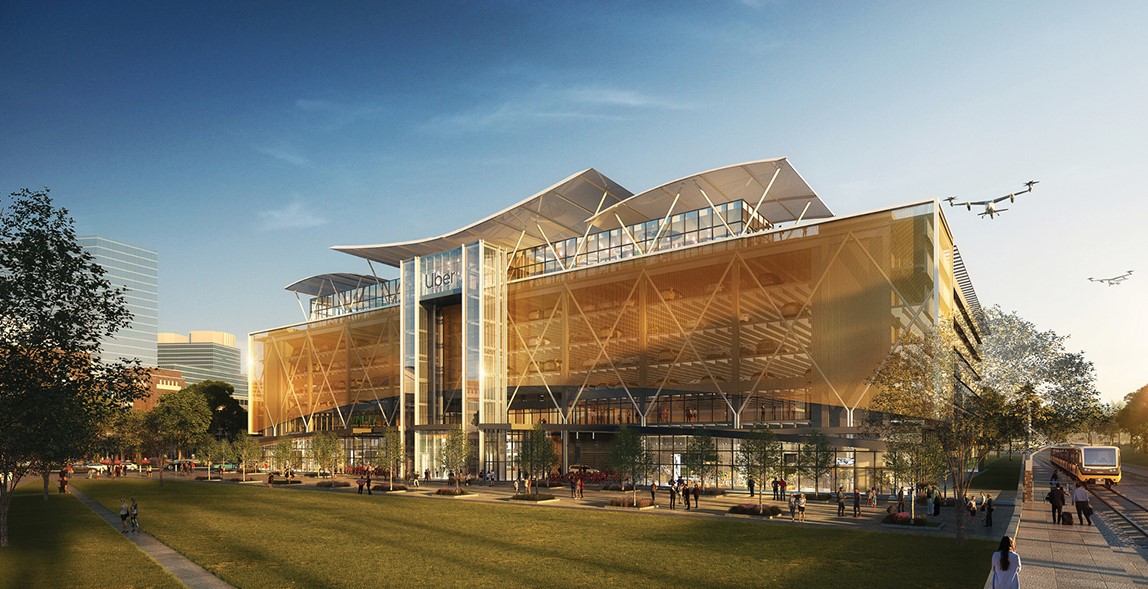
by Michael Willoughby
Uber Elevate has selected North Texas to be the site of its first flying taxi service in 2023 the company announced at a Washington DC summit for its developers, last month.
The so-called Uber Air Skyport Mobility Hub could be located either in Dallas Forth Worth or Frisco.
At the summit, architect, BOKA Powell unveiled two speculative design concepts for the facility in the two cities, focusing on retrofitting an existing parking structure within the urban core, and second, a suburban location that would serve as a mixed-use development with a transit hub, retail, and other uses.
Both schemes link ground with air, providing recharge/service fleets of Uber ground vehicles (self-driving cars in the future), JUMP bikes and scooters (also part of the Uber network), as well as operations for Uber Eats ground couriers.
The Downtown Dallas location, near Victory Park, is envisioned as a retrofitted parking garage where the Uber Air components (arrival, passenger holding spaces, and take-off and landing areas) are efficiently added to the existing structure. The downtown location is considered a true inter-modal transportation hub that connects users to the Uber network (cars, bikes, scooters, and Uber Eats), private vehicles parked in the garage, as well as public light rail and bus systems.
Frisco was selected because of the greater availability of land area in addition to catering to real life-needs for people who live in suburbs and commute downtown. The suburban site explored aspirational goals of having the Skyport as a nucleus to an “Uber Village,” with energetic retail at each corner, and an Uber Experience Center where users can learn about the technology. The soaring shade structure gives the building an identity and ties all of the pieces together. The modular, linear layout of the Skyport allows for easy scalability in the future by adding aircraft landing zones next to existing structure.
The capacity of both “Skyport Mobility Hub” solutions is based on interconnecting Uber brands and meeting specific throughput requirements (provided by Uber as part of their design challenge):
Downtown Dallas
2 FATO (Aircraft Landing Areas)
5 eVTOL Aircraft Parking Areas
150 Electric Bikes
150 Electric Scooters
75 Electric Vehicle Charging Stations
Frisco
2 FATO (Aircraft Landing Areas)
5 eVTOL Aircraft Parking Areas
200 Electric Bikes
200 Electric Scooters
100 Electric Vehicle Charging Stations
On Both
JUMP bike operations center (20,000 SF)
Uber Greenlight Hub (10,000 SF)
Architects were inspired by a desire to celebrate the joy of human flight and the experience of travel ― the continuum of multi-modal transportation through bold, recognizable architecture emphasizing the concept of “flow” and the process of advanced movement.
“The Uber Skyport Mobility Hub as imagined by BOKA Powell Architects celebrates our evolving experience-driven society by designing fluidity and transparency into the process of air travel re-imagined,” said BOKA Powell design principal Andrew Bennett.
“The integration of all Uber brands substantiates first and last mile travel as major support elements to the Uber Air component that revolutionizes urban mobility. The Mobility Hub is not a thing, but rather a place of dynamic energy and integrated connectivity that celebrates the spirit of flight and the freedom to quickly access the important places in one’s life.”
The designers focused on taking Uber’s legendary ride-sharing technology and layering on the multiple Uber brands to provide seamless connectivity across dense urban areas.
Image credit of Dallas render, BOKA Powell
For more information

